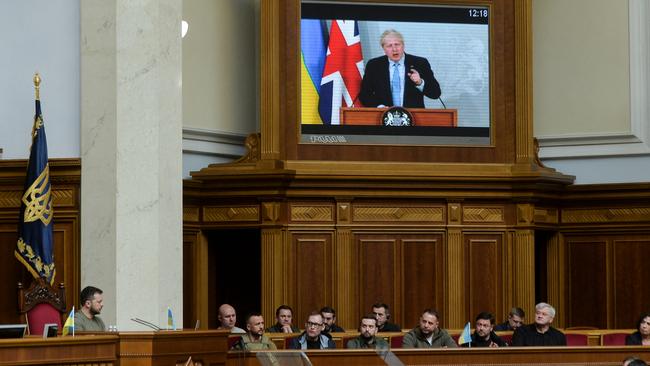Boris Johnson echoes Churchill im speech to Ukraine Parliament
The British Prime Minister pledges to send more weapons to Ukraine in its campaign to fend off Russian invasion.

Invoking the words of Winston Churchill, British Prime Minister Boris Johnson has pledged to send more weapons to Ukraine in its underdog campaign to fend off the Russian invasion.
Mr Johnson, in the first address to Ukraine’s parliament by a Western leader since the war began, drew parallels to Britain’s resolve against the Nazis during World War II.
“When my country faced the threat of invasion during the Second World War, our parliament – like yours – continued to meet throughout the conflict,” he told Ukrainian MPs via videolink.
“And the British people showed such unity and resolve that we remember our time of greatest peril as our finest hour.”
The speech echoed Churchill’s appeal to the British nation in June 1940, as he called the country to fight the Nazis in their “finest hour”. A former journalist, Mr Johnson once wrote a book about Churchill.
Since the start of Russia’s invasion of Ukraine, Johnson has positioned himself as Ukrainian President Volodymyr Zelensky’s point man in the West, encouraging allies to tighten sanctions on Russia while pumping more weapons into Ukraine.
The 57-year-old British leader is now reaping the rewards of being an early and outspoken cheerleader for Ukraine.
“He was one of the few, if not the only among European leaders, to openly describe Russia as a true menace to freedom and democracy and to praise Ukrainians,” said Thornike Gordadze, a former Georgian government minister who is now at the International Institute for Strategic Studies.
Over the past two months, the UK has joined the US in ratcheting up pressure on the Kremlin, helping to beat a path for other Western nations to sharpen their stances against Russia, officials and analysts say.
Now the British government wants Russia kicked out of Ukraine entirely.
“Ukraine will win,” Mr Johnson said Tuesday. “Ukraine will be free.”
Britain has provided £2bn of aid to Ukraine. It has donated around 6000 anti-tank missiles and is playing an important role in sourcing weapons as Ukraine engages in a grinding war in the Donbas. On Tuesday, the UK offered £300m in extra equipment to the Ukrainian army.
The war proved a timely political boon to the British leader. Before Russian President Vladimir Putin’s invasion, Mr Johnson was facing a rebellion among his Conservative Party over allegations that he broke Covid-19 lockdown rules to attend several social events in Downing Street. Calls for him to quit subsided, with MPs citing the importance of not changing leaders in the midst of a war. A poll by Ipsos Mori on Tuesday showed that 58 per cent of Britons approved of Mr Johnson’s handling of the crisis in Ukraine.
Mr Johnson wasn’t always so hawkish on Russia. After he became foreign secretary in 2016, he led an attempt to rebuild relations with the Kremlin. His views on Russia hardened in 2018 after the UK government accused Moscow of launching a chemical attack on British soil that left a British citizen dead and a former Russian double agent and his daughter in hospital.
Mr Johnson helped co-ordinate the expulsion of several dozen Russian diplomats across the West in retaliation. Russia denied it was involved.
Britain’s departure from the EU – a project championed by Mr Johnson – saw a rethink of foreign policy. Following Brexit, Britain has marketed itself as a more active defender of democratic values. UK officials saw involvement in Ukraine as a way to prove to the Biden administration it was a reliable partner. Its tough stance on Russia is aided by the fact that it doesn’t rely on supplies of Russian natural gas and oil.
The UK has been training troops in Ukraine since 2015. A month before Russia’s invasion, the UK started supplying anti-tank missiles to Ukraine. Its intelligence services worked closely with the US to expose Russia’s intentions. Within hours of Russia’s attack, Mr Johnson said that Mr Putin “must fail” and began lobbying for Russian banks to be cut off from the Swift payments network.
Mr Johnson and Mr Zelensky struck up a close working relationship. At the start of Russia’s invasion they talked almost daily. Mr Johnson visited Kyiv last month where the two men ate a roast beef dinner after wandering around the city centre.
Mr Zelensky has in return singled out Mr Johnson for praise and offered him the chance to address Ukraine’s parliament, the Verkhovna Rada.
The Wall Street Journal



To join the conversation, please log in. Don't have an account? Register
Join the conversation, you are commenting as Logout